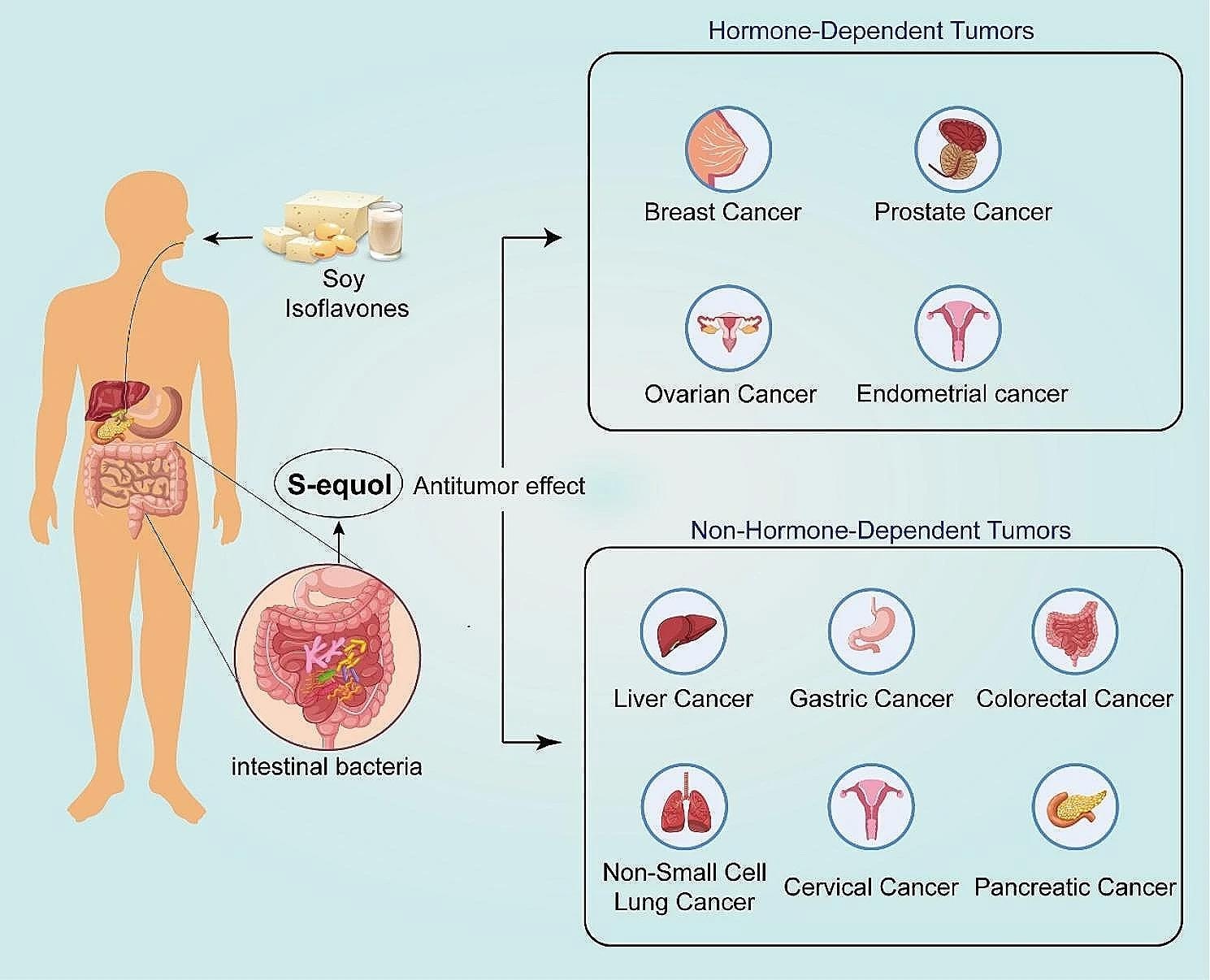Soybeans and soy products benefit human health due to compounds like SI. Increased SI intake is linked to reduced risks of cardiovascular disease, hormone-dependent cancers, osteoporosis, and menopausal symptoms. SI act as phytoestrogens, binding to estrogen receptors and mimicking estrogen effects.
SI in soybeans are mostly glycosides, which are less bioavailable. Gut microbiota converts these into more bioavailable aglycones. Equol, a key metabolite, binds to estrogen receptors, helping with menopausal symptoms, osteoporosis, and hormone-dependent cancers. Equol also has anti-androgen and antioxidant properties, contributing to its anti-tumor effects.
Despite its promise, further research is needed to fully understand equol's synthesis, metabolism, and mechanisms of action in various tumors. In the present article, researchers explored equol's chemical properties and metabolism, its synthesis by intestinal microbiota, and its role in various tumors, offering insights for future research on equol's preventive effects and mechanisms in cancer.
Biological properties of equol
Equol is a compound derived from soy products and was first discovered in the urine of pregnant horses in 1932. It appears in human urine and blood and exists in two forms: R-equol and S-equol. S-equol, produced by gut bacteria from soy glycosides, has a stronger effect on certain estrogen receptors (ERβ) than R-equol, which targets ERα.
The process of converting soy isoflavone daidzein into equol involves several steps, key enzymes, and specific gut bacteria. Equol is more stable and remains in the body longer than other flavonoid compounds, providing extended health benefits.
However, not everyone can produce equol. This ability varies by diet and population, with more vegetarians being equol producers than non-vegetarians. Increasing soy intake does not help those who cannot generate equol. Research shows that transplanting gut bacteria from equol producers to non-producers may enable equol production. In summary, equol's health benefits depend heavily on the presence of specific gut bacteria, and factors like diet, age, and genetics influence equol production.
Equol and gut microbiota
The gut microbiota, a complex ecosystem of microbes colonizing the human intestines, has a metabolic capacity 100 times greater than the liver, playing a crucial role in the host's metabolism. Only 25-50% of the world's population, predominantly in Asia, can convert daidzein to equol, highlighting the importance of gut microbiota in this process. Equol producers are shown to have a decreased risk of hormone-dependent diseases.
Key bacteria involved in equol production include Eggerthella sp. Julong 732, Eubacterium FJC-A10, and others that can metabolize intermediate products like dihydrodaidzein (DHD) into equol. Some bacteria, such as Eggerthella sp. YY7918 and Lactococcus garvieae 20-92 can independently produce equol.
Research has shown that co-cultivating different bacterial strains can enhance equol production. Additionally, factors like diet, age, and antibiotic use affect equol production. Understanding the gut microbiota's role in equol metabolism can inform dietary adjustments and strategies to increase equol production for health benefits.
The anti-tumor effect of equol
Equol exhibits significant potential in preventing hormone-dependent cancers such as breast and prostate cancer. Its actions stem from its ability to mimic and antagonize estrogen, interacting with estrogen receptors to modulate cell proliferation, apoptosis, and hormone levels. The effectiveness of equol varies among populations and is influenced by genetic factors affecting its production.
Studies highlight equol's role in inhibiting tumor growth, enhancing chemotherapy outcomes, and potentially converting non-producers into producers through dietary interventions. Beyond hormone-dependent cancers, equol shows promise in non-hormone-dependent tumors like colorectal, gastric, and liver cancers, owing to its antioxidant properties and ability to regulate cellular pathways involved in cancer progression. Further research is needed to elucidate equol's mechanisms fully and optimize its use in cancer prevention and treatment strategies, considering its diverse effects across different cancer types and populations.
 Conversion of dietary isoflavones to equol by human gut microbiota and its antitumor effects schematic illustration
Conversion of dietary isoflavones to equol by human gut microbiota and its antitumor effects schematic illustration
Conclusion
In conclusion, although equol shows promise in cancer prevention and treatment, its effective concentration range and specific mechanisms in different tumor types remain unclear. It is important to further investigate the role of intestinal microbiota in equol metabolism and the potential of probiotics or fecal microbiota transplantation to increase equol production. Epidemiological studies suggest a complex relationship between equol levels and cancer risk, with some conflicting evidence regarding its effects on non-hormone-dependent cancers.
Future research should focus on understanding equol's effective concentration range, its impact on tumors with varying ER expressions, and the actions of its different isomers. This will aid in the rational application of equol in disease prevention and clinical treatment.